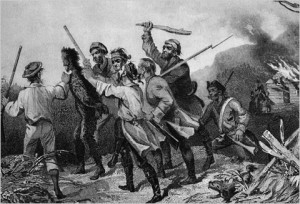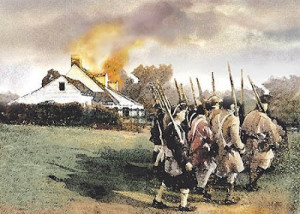The Whiskey Rebellion took place in the United States in protest of an excise tax on distilled spirits. The tax was first proposed by Alexander Hamilton as a means to pay off the national debt that was acquired during the Revolutionary War. The tax was largely unpopular on the western frontier where distilling spirits was a popular way to use surplus grain.
The whiskey rebellion was a defining moment in American history. The rebellion was really the first major demonstration of the federal government’s power over the American states and colonies. From the governments point of view the whiskey tax was a luxury tax. However, many people saw the tax as a direct attack on their livelihood and way of life.
The tax had a greatly negative effect on farmers who lived in the more rural areas of Kentucky and Western Pennsylvania. The reason for this was that these farmers had a harder time transporting their grain to market. The most efficient and profitable method for transporting and selling their grain was to distill it into alcohol. An  ambitious farmer could turn hundreds of pounds of grain into a few cases of whiskey. As such, it was significantly easier to transport and sell a few cases of whiskey than it was to sell hundreds or even thousands of pounds of lose grain.
ambitious farmer could turn hundreds of pounds of grain into a few cases of whiskey. As such, it was significantly easier to transport and sell a few cases of whiskey than it was to sell hundreds or even thousands of pounds of lose grain.
Another important aspect of rural life was that they were more heavily based on a barter system in which whiskey acted as a form of currency. Many of these farmers had fought in the revolutionary war. After the war they had been paid in currency that quickly diminished in value. Inflation was so bad that some veterans used the money as wall paper and insolation. On the other hand whiskey tended to hold its value.
The whiskey tax affected some states much more than others. For example, states that primarily grew cotton or tobacco were not as affected by the tax as other states that primarily grew grain. Another issue was that the onetime fee was a fee on owning a still. Eastern distillers had large still whereas the western farmers had significantly smaller stills. Yet they were expected to pay the same amount. Another issue was that many distillers were required to pay by the gallon. Large eastern distillers only had to pay a tax of 6 cents a gallon, whereas the small western distillers were expected to pay 9 cents per gallon. As such, the whiskey tax effectively preventing them from ever having a chance of legally producing alcohol.
the gallon. Large eastern distillers only had to pay a tax of 6 cents a gallon, whereas the small western distillers were expected to pay 9 cents per gallon. As such, the whiskey tax effectively preventing them from ever having a chance of legally producing alcohol.
George Washington owned a major distillery after he served as president. In the final year of his life, 1799, his distillery made 11,000 gallons of rye whisky which sold for 50 cents per gallon. He had a top shelf whisky that sold for 1 dollar per gallon, which was run through his still four times.
Washington’s farm manager, Scotsman James Anderson, began distilling whiskey in February 1797, in the final months of Washington’s presidency. Anderson convinced a reluctant Washington to build a large-scale distillery a few months later, and the distillery was completed in March 1798. At the height of production Washington owned the largest distillery in America.
The fact the Washington owned such a large distillery may come across as being a tad hypocritical. This is largely due to that fact that just three years earlier Washington led troops to put down the “Whisky Rebellion.”
The Whisky Rebellion of 1794 was so controversial that it nearly brought America to the brink of civil war. To tax a still back then was to tax the very income and livelihood of the frontiersmen. The only way those folks could get their crops to market to sell was to turn them into whiskey. A good still would trade for a 250 acre farm back then and people relied on them for income to feed and shelter their families.
Alexander Hamilton, then Secretary of the Treasury, was a Federalist advocating a strong central government under a monarch. The states, especially the western frontier states, considered themselves self-governing members of a coalition. Hamilton believed a military confrontation was required to establish the supremacy of the federal government over the states.
Hamilton crafted the excise tax of 1791 to incite resistance. The act mandated the registration of all stills, appointed tax collectors with powers of search and seizure and taxed all whisky at a flat rate of 7¢ per gallon at the still. The professed goal of the tax was to raise 21 million dollars for defense. At 7¢ per gallon, this equates to 300,000,000 gallons of whisky, which tells us there must have been one hell of a thriving moonshine industry.
This was a direct insult and attack on the very people who had just won the freedom for the new country. It was on the bravery on the frontiersmen that the revolution was won. Many of those who fought in the Revolutionary War did so because they wanted to live in a country that exemplified the ideals of freedom and equality.
The law was so unpopular that no one would accept the position of tax collector. The tax was unfair. Whisky sold for 25¢ a gallon on the frontier, 50¢ in the more settled eastern regions. Thus, the struggling farmer on the frontier was taxed at 28% on his moonshine, whereas the bigger distilleries snug and safe in the eastern regions only paid 14%.
Things went from bad to worse. In August 1794, about 7,000 frontier militiamen marched on Pittsburgh, threatening to destroy the city unless the “obnoxious characters” were banished. George Washington, at Hamilton’s urging, mobilized 13,000 troops under Robert E. Lee’s father. This number of troops was more than Washington usually had under his command during the Revolution.
Washington appointed commissioners to travel in advance of the army, to meet with rebel leaders to negotiate peace and offer amnesty. A few citizens were killed; more were arrested and carted off to Philadelphia for trial. Ultimately, all the prisoners were released, acquitted or pardoned and officially the federal government won. Washington’s popularity sank so low that he did not seek a third term.
When Thomas Jefferson succeeded him as president in 1802, one of the first things he did was repeal the hated excise tax. So, for the next 50 or 60 years Americans happily turned amber waves of grain into oceans of tax-free booze.
“And, as an encouragement to them to behave well, and to attend diligently to their
Duty, the Colonel [Washington] promises to give them, so long as they deserve it, four
gallons of rum, made into punch, every day.”
General Orders
August 7, 1756
“In like Manner, since our Imports of Spirit have become so precarious, nay
impracticable, on Account of the Enemy’s Fleet which infests our Whole Coast, I would
beg leave to suggest the propriety of erecting Public Distilleries in different States. The
benefits arising from moderate use of Liquor, have been experienced in All Armies, and
are not to be disputed !!”
George Washington to the President of Congress
August 16, 1777
“It is necessary, there should always be a Sufficient Quantity of Spirits with the Army, to
furnish moderate supplies to the Troops. In many instances, such as when they are
marching in hot or Cold weather, in Camp in Wet, on fatigue or in Working Parties, it is
so essential, that it is not to be dispensed with. I should be happy if the exorbitant
price, to which it has risen, could be reduced.”
George Washington to William Buchanan
August 20, 1777

Great article.